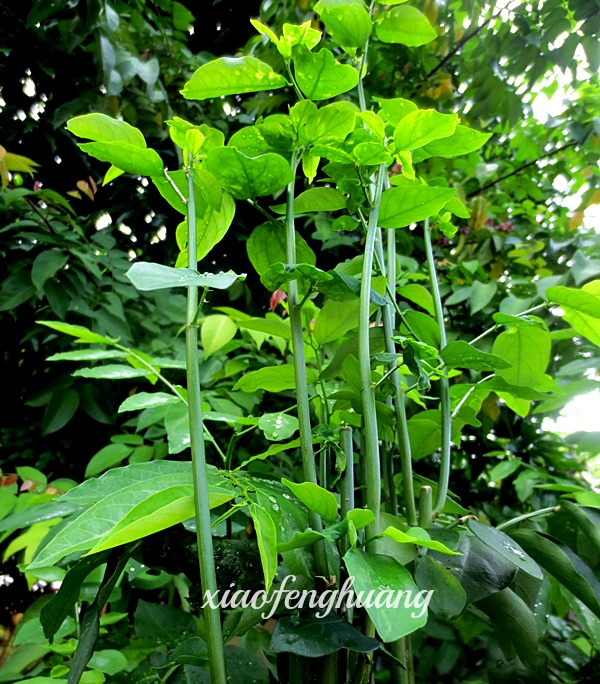Cangkuk manis a.k.a Cekor manis which means sweet shrub is the most palatable and therefore by right is the most popular leafy vegetable in Malaysia. Its botanical name is Sauropus androgynus. What has been eaten by us Malaysians is actually a cultivar meaning it was once a small shrub found growing wild in the rainforest. In Chinese it is called Shu Cai(树菜,树仔菜)which means ‘ tree vegetable’. In English it is called Star gooseberry and Malay Cheera in India.
Cangkuk manis plant grows to 1.5 m tall with dark green stems and light or dark green leaves. The shoots and young leaves taste great in soup and stir-fry dishes. Before cooking, leaves must be squeezed and crushed by hands .

Basically there are two varieties, one is the thin leaf type and another one is the thick leaf variety. The thicker leaf type has smaller and darker green leaves.
The picture shown above is the thin leaf type of cangkuk manis. Usually only the shoots are eaten because the older leaves are too tough for cooking, even after crushing with hands.

The picture shown above is the thick leaf variety of cangkuk manis which is considered as the best among all the varieties. Its dark green leaves are thick and crispy. All the leaves, young or old, can be stripped for cooking purpose. This is not possible with the thin leaf type with old leaves too tough for cooking. This variety is great for stir-fry or frying with mee or any noodles because it can be crushed easily by hands and can be cooked in a few minutes. Usually we keep this variety for frying purpose and the other type of cangkuk manis for cooking soup.
Cangkuk manis flowers and fruits borne below the leaves. The dark maroon coloured flowers will fade away after the fruits are formed. Both flowers and fruits are edible. The plant can be propagated by vegetative cuttings.

This vegetable is rich in vitamin A and C but beware that it contains the alkaloid papaverine which is bad for lungs. Asthmatic people should avoid taking too much of it. Under any circumstances, one should not consume raw cangkuk manis. There were cases reported in Taiwan a few years back that those who drank its juice raw for weight loss purpose had suffered lung impairment.
Its potassium content is high which is 2620 mg. Check Table 7 for its nutrients content.
The picture below shows basic ingredients for the fried mee recipe.

Recipe
Ingredients
- 200 g crushed cangkuk manis( the thick leaf type)
- 200 g salted long life mee – 1 packet
- 1 chilli
- 3 cloves garlic(optional)
- 1/2 tsp white pepper powder
- 1/2 tsp mushroom powder
- 2 tbs roasted soy cubes – soaked in water for 15 minute. Drain the cubes for later use.
Method
- Prepare the mee by soaking it in 1 litre of ying-yang water with equal portions of boiling water and tap water for 2 minutes or until it is loosen. Never use 100 % boiling water for this purpose or else the mee will become too soft.
- Add 1 tbs of oil to the loosen mee .
- Fry the soy cubes with garlic and chilli.
- Add in the mee and stir fry until slightly brown.
- Lastly add the cangkuk manis. Sprinkle a few drops of water from time to time so that the vegetable can be cooked. The mee is slightly salty so no salt should be added to this dish.

A popular dish among the natives in Sarawak is stir-fried cangkuk manis with pumpkin. As usual, cangkok manis leaves have to be squeezed by hands and retain the green juice which should be added to the dish. To cook masak lemak, just add coconut milk to this dish.

Recipe
Ingredients
- 200 g pumpkin – diced without the skin. Choose the old or ripe pumpkin which is thicker in flavor and sweeter in taste. Old pumpkins have older and harder seeds.
- 200 g cangkuk manis
- 1 chilli
- 1 tsp light soya sauce
Method
- Fry pumpkin cubes until slightly brown.
- Add 1/4 cup of water and continue cooking until pumpkin cubes turn soft.
- Add in cangkuk manis and stir-fry for a while.
- The dish is done by adding chilli and light soya sauce to it.
The dish looks simple enough to cook but you will be surprised by its natural flavour and sweetness which is so appetizing.
Other ways of cooking cangkuk manis include stir-fry it with baby corn, unripe durian, fresh bean curd(Dou Bao) and make vegetable pancakes. It is also the main ingredient for Hakka Ban Mian(客家板麵), the broad mee cooked in Cangkuk manis soup. Not to forget it is also one of the side dishes for lei cha. Here in Sarawak, people like to fry it with eggs.
Oh yes, once you have tasted this vegetable, you might get addicted to it. It just happens. Don’t ask me why……..
Ever popular vegetable in Malaysia,
It can be found at homes, coffee shops and restaurants.
Copyright claim – Do not crop any pictures from malaysiavegetarianfood.com. Do not share our pictures without any watermarked signature on them. Excerpts from our articles to be credited to malaysiavegetarianfood.com.
